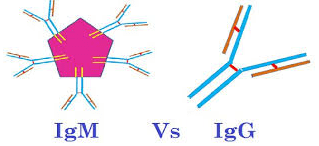IGG and IGM

The Differences between IGG and IGM is given here. Immunoglobulin G (IgG) is one of the five types of antibodies that our body produces and is found in blood, cerebrospinal fluid, and peritoneal fluid. Immunoglobulin M (IgM) is found in the blood and lymphatic fluid, it is the first to be generated by our body to fight infection.
keep reading…
IGG
It is one of the five types of humoral antibodies that our body produces. It is the most abundant type of immunoglobulin in body fluids, such as Blood, peritoneal fluid, and cerebrospinal fluid.
It is a specialized protein synthesized by the body in response to the invasion of bacteria, viruses, and fungi.
It is the most abundant immunoglobulin in our body, it is found in a concentration of 600-1800 mg per 100 mL and it constitutes 80% of the total immunoglobulins. It has a half-life of 25 days.
It is the only class of immunoglobulin that crosses the placenta and transmits immunity from the mother to the fetus in a natural and passive way.
It is also the smallest type of immunoglobulin, having a molecular weight of 150,000 Daltons. This feature allows you to move quickly through the circulatory system and tissues.
IGM
It is one of the immunoglobulins present in mammals and constitutes 6% of the immunoglobulins present in our blood. It is considered the oldest antibody in evolutionary history.
It is also known as macroglobulin due to its size (It is the largest antibody) it has a size of 950,000 Daltons.
Due to its large size, it is located in the intravascular space.
suggested video: IGG vs IGM
Differences between IGG and IGM
- Immunoglobulin G or IGG is the most abundant antibody in the human body. It is found in blood, peritoneal fluid, and cerebrospinal fluid.
- IGG is transmitted from the mother to the fetus through the placenta.
- Immunoglobulin M or IGM is found in lymphatic fluid and blood. It is the first antibody produced by the human fetus and it is also the first to act in case of infection.
- IGG is the body’s long-term response to illness. It is the antibody that gives us immunity after contracting a disease such as chickenpox or measles.